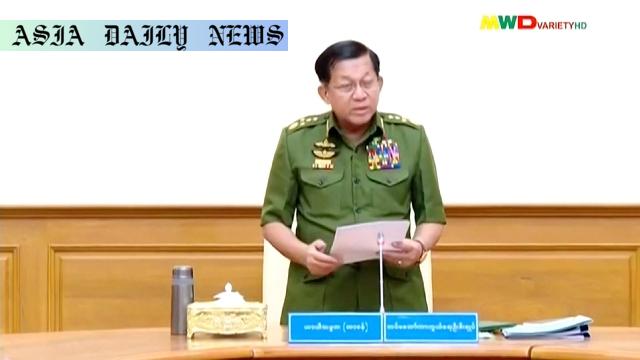Myanmar lifts state of emergency, hinting at possible general elections in December; uncertainty surrounds future civilian rule.
Myanmar’s military announced the lifting of the state of emergency on Thursday.
This decision could open the way for general elections expected in December.
Uncertainty remains as intense distrust from opposition groups persists.
Emergency had been in place since the military seized power in 2021.

Myanmar Announces End of State of Emergency
The military leadership in Myanmar has made a significant decision to lift the state of emergency that was in effect since 2021. This announcement, made on Thursday after a meeting of the National Defense and Security Council, marks a pivotal moment in the country’s political timeline. The state of emergency was first imposed when the military seized power from the democratically elected government, resulting in widespread unrest and protests.
Military leader Min Aung Hlaing confirmed that a general election, long postponed due to the emergency, is expected to take place in December. However, substantial skepticism surrounds whether this promise will be fulfilled. The political landscape has been deeply fragmented over the past two years, with resistance groups actively challenging military rule through various means.
Will This Lead to Civilian Rule?
The lifting of the state of emergency is being viewed by some as a potential step toward restoring civilian governance. Yet, the path to achieving this remains fraught with challenges. Opposition factions, including those aligned with ousted civilian leader Aung San Suu Kyi, have expressed distrust in the military’s declarations regarding elections. They argue that without proper safeguards, any eventual election may be far from free and fair.
The promise of returning to democratic rule rings hollow for many citizens who have suffered under years of military dominance. The international community has also voiced concerns about the sincerity of the military in allowing a transparent electoral process. Observers are divided on whether the move to lift the emergency is a genuine effort to stabilize the nation or a strategic attempt to consolidate power.
The Political and Social Impact
For ordinary citizens, the lifting of the emergency presents a moment of cautious optimism. Many hope that this decision will lead to tangible improvements in governance, human rights, and living conditions. However, the reality is that the social and economic consequences of prolonged military rule have left deep scars. Protests, conflicts, and widespread economic challenges have exacerbated the suffering of millions across the nation.
The return to normalcy, if at all feasible, requires a collaborative effort among the military, opposition groups, and civil society organizations. Only through meaningful dialogue and compromises can Myanmar hope to regain political stability and societal harmony. At the same time, the concerns about the military’s legitimacy and accountability remain paramount in any discussion about the country’s future.
International Reactions and Implications
Myanmar’s recent move has garnered global attention, with governments and international bodies closely monitoring the unfolding developments. The lifting of the state of emergency has been met with guarded optimism by the United Nations and Western powers. Many have called for the military to honor its commitment to holding credible elections and ceasing hostilities against opposition groups.
Regional neighbors, including ASEAN members, have emphasized the importance of stability in Myanmar for the broader stability of Southeast Asia. They stress that Myanmar must adhere to democratic principles to regain its place as an active and respected member of the international community. Analysts suggest that sustained international pressure and diplomatic engagement may prove pivotal in holding Myanmar’s military accountable for its actions.
The Road Ahead
While the lifting of the state of emergency is undoubtedly a significant development, Myanmar faces an uphill battle to restore democracy and reconcile its deeply fractured society. The road ahead requires substantial effort from all stakeholders to ensure genuine progress. The military’s commitment to elections in December must be closely scrutinized by domestic actors and international observers alike.
In addition to political reforms, the nation must address pressing socioeconomic challenges that have worsened due to prolonged instability. The resilience of Myanmar’s people and their unwavering demand for democracy stand as a testament to the strength of their collective spirit. The coming months will be crucial in determining whether Myanmar can overcome its challenges and embark on a new era of stability and growth.



Commentary
A Mixed Bag of Hope and Skepticism
The lifting of Myanmar’s state of emergency has brought with it a mixture of cautious optimism and lingering uncertainty among citizens and observers alike. For a country that has endured two years of political turmoil, the announcement represents a notable development, signaling the potential for change. Yet, the military’s track record offers limited assurances, leaving many to question the sincerity of this move.
What Lies Beneath the Announcement?
On paper, the decision to end the state of emergency appears to open the door to general elections and, possibly, a return to civilian governance. However, the reality is far more complex. Myanmar’s military remains a deeply entrenched power, and its commitment to democracy is questionable at best. As opposition groups continue to resist military authority, the potential for renewed conflict looms large.
A Moment of Global Attention
The international community also faces a critical juncture as it observes Myanmar’s next steps. World powers must balance the need to engage constructively with the military while advocating for democratic values. Regional allies, in particular, have a significant role to play in encouraging accountability and fostering dialogue among all parties involved.
The Path to Reconciliation
If Myanmar is to navigate these troubled waters successfully, it will require more than just elections. A comprehensive framework for political reconciliation and socioeconomic recovery is essential. Only then can Myanmar move toward a future of genuine stability and democratic governance. Until such measures are implemented, skepticism will undoubtedly linger over the military’s true intentions.